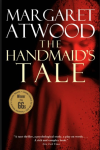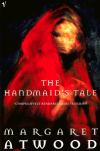








This isn’t a proper review of Atwood’s famous novel but some of my impressions and reactions to it and a brief summary. Since the US election, the sales of books like 1984 and the Handmaid’s Tale have risen. While I had read the former, I hadn’t read Margaret Atwood’s novel. In many ways it wasn’t what I expected at all. It’s interesting, complex, and clever but I don’t think it’s a book I’ll read again. There are amazing observations, long quotable passages, but as a whole, I found it dull. Even so, reading it infuriated me, which certainly proves that it’s a powerful book. Interestingly though, the element that triggered this response is an element that I haven’t seen mentioned in any of the reviews I’ve come across but it’s something that is essential to totalitarian and oppressive societies. The aspect I’m referring to is the instrumentalising of the oppressed. No matter what toxic system/government/injustice, it is hardly ever maintained without the help of the oppressed. This complicity of the oppressed is something that infuriates me in real life so much that I couldn’t overlook it. The fact that people don’t mention it, shows how astute Atwood’s depictions were. Just like in real life, it’s something so upsetting that it’s like a blind spot.
What is The Handmaid’s Tale about? The book is set in a near future, in the state of Gilead, formerly known as United States of America. A series of ecological disasters and war have led to its people being mostly sterile. After a coup, a totalitarian group of fanatic Christians has taken power. Women are divided into groups. Those married to government officials, those who breed for those who can’t have children and those who are used in other ways – sent to the colonies where they will discard toxic waste, or those used to make the system work, instruct the breeding women.
Offred, the narrator, is one of the Handmaid’s, destined to breed. At the time when the story is set, this whole system is new, so women like Offred are the first of their kind. What makes their fate particularly harrowing is that they knew a “before”. They used to live normal lives that were pretty much the same lives we still live today. That life ends when their bank accounts are closed and all their money and belongings go to their husbands. Those who’ve had children are then ripped from their families and assigned to rich couples who can’t have children.
Offred describes her life in minute details. They don’t have any freedom at all. They are all dressed the same and basically not allowed to do or say anything, unless it’s according to the new laws. Public executions are a means to make everyone obedient. But there’s an underground movement and, as it seems Offred met one of the women of this movement.
I’ll stop the summary here because if you’ve not read it you might enjoy finding out, how this story is told. It’s structure is one of the best things and the only element that contains a glimmer of hope in an otherwise dark and depressing tale.
Obviously, reading about a world in which women are owned by men and have no freedom whatsoever, is scary and infuriating but that’s nothing compared to the fact that women are in charge of the “training” of the handmaids. The way in which Atwood portrays how this system is regulated and reinforced is so clever.
There is more than one kind of freedom, said Aunt Lydia. Freedom to and freedom from. In the days of anarchy, it was freedom to. Now you are being given freedom from. Don’t underrate it.
The quote shows that some women accept the explanations given by the government. They also accept to be the instrument of the government. In some instances because they believe that women are, in many ways better off than before, but also because becoming executors, helps them to escape either death or being worked to death in one of the toxic landfills.
Why is it that victims enforce the system that exploits them? Fear and self-preservation are some of the reasons, but there’s also something far more toxic – they have internalized the system.
The Handmaid’s Tale is bleak but there’s a glimmer of hope, as I mentioned before. While some of the oppressed help keep up the system, there are many who plot an uprising.
Before ending this post, I’d like to mention one other aspect that I found chilling. One reason why women were so easily disempowered was because pre-Gilead society didn’t use cash but only credit cards. That way it was easy to stop the women’s access and transfer their money to their husband’s account and to disempower them completely. They didn’t even have enough cash to buy a ticket to somewhere else and escape. I found this chilling because I know a great many people who say that we are moving away from cash and to the exclusive use of cards/online banking etc.
When The Handmaid’s Tale was published, readers thought that Atwood depicted a Muslim society. Maybe she did. I think we shouldn’t read it like that. We should read it as a portrayal of the belief system and the functioning of a totalitarian government. Thinking that she wrote about a Muslim society is something we cannot afford. It can happen in other societies as well.
Now on to something different. Look at those covers! And I haven’t even posted all of those I found. Mine is the one on the far left. It’s not my favorite. The one I’m most familiar with is the second to the left, the one I like the most is the fifth from the left but I actually find the first and the last to do the book more justice. Do you have a favourite?
